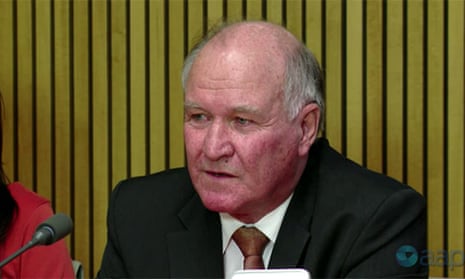The federal government wants to hand safeguards protecting water supplies from large coal mining projects to the states and territories, in a move bitterly opposed by the Greens, environmental groups and the former independent MP Tony Windsor.
Windsor, the former New England MP, told Guardian Australia that Greg Hunt, the environment minister, had broken his word after promising him the so-called “water trigger” would not be devolved to the states.
“I spoke to Greg in Canberra six weeks ago and I asked him whether he would let go of the water trigger,” Windsor said. “He said ‘no, I don’t think we will do that’. He didn’t think it would get through the new Senate.”
Hunt told Guardian Australia that he informed Windsor the government would not be abolishing the water trigger, rather than tell him it wouldn't be devolved.
He said he "categorically and absolutely rejects" Windsor's recollection of the conversation, calling it "utterly false".
Windsor was a key instigator, with the previous Labor government, of the water trigger, due to his concerns over the impact of the expanding coal seam gas industry on groundwater supplies in his NSW electorate.
Under the amendment, coal or gas developments likely to have a significant impact on water resources are assessed by the federal government.
However, the Coalition has introduced a bill to devolve this responsibility, in line with its plan to create “one stop shops” of environmental approvals run by the states and territories.
The legislation will allow bilateral agreements between federal and state governments to “operate effectively and efficiently and to provide certainty to proponents”.
The bill will ensure that states and territories do not need to refer developments to the commonwealth for actions covered by a bilateral agreement. This will now include water impacts.
In addition, the bill would allow states to authorise third parties, such as local councils, to give approval on developments that affect nationally important environmental matters.
Windsor, who retired from politics at the last election, said devolving the water trigger would be a bad outcome for the environment, miners and local communities.
“What Greg Hunt is doing is allowing the flawed state process to come back in, at a time where many of the players in NSW are before Icac [the Independent Commission Against Corruption] and many others have been accused of being dodgy,” he said.
“Having the states approve projects they benefit from is like having the fox in charge of the chicken coop.
“The implications are bad for the mining industry because people in those areas in NSW don’t have faith in that process. It will lead to civil unrest. The commonwealth has to have involvement in this area.”
Windsor said he would be talking to Clive Palmer and other balance-of-power figures in the new Senate to stress the importance of federal oversight of water.
Greens senator Larissa Waters said the bill was “rubbing salt into the wound” following an anti-environment budget.
“The government’s bill will let minister Hunt give state and territory governments the final say over whether coal seam gas and large coal mines should go ahead, without any federal checks of water impacts,” she said.
“But the bill doesn’t stop there – it further clears the way for all federal environmental approval powers to end up in the hands of state governments, winding back national environment protection by more than 30 years.”
Ruchira Talukdar, healthy ecosystems campaigner at the Australian Conservation Foundation, said the amendment would weaken environmental protection.
“This is yet another in a series of blows by a government showing its anti-environment credentials,” Talukdar said.
“The federal government needs to take a leadership role in matters of national environmental significance, especially when they impact on our scarce water resources.”
Hunt and the Labor spokesman, Mark Butler, have been contacted for comment.

Comments (…)
Sign in or create your Guardian account to join the discussion